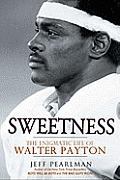There was a lot of anticipation at Shelf Awareness about the embargoed copy of Sweetness: The Enigmatic Life of Walter Payton by Jeff Pearlman (Gotham). Chicago Bears running back Payton is considered by some to be the greatest football player ever--and by most as one of the greatest. He was respected both as a player and a person, he was an inspiration to many, and he died far too young at the age of 45. Unfortunately most of the pre-publication press focused on the parts of the book about Payton's depression, suicidal thoughts, philandering and addiction to painkillers.
 What has been ignored is the entire book--a thoughtful, profound, respectful story of a larger-than-life man. It's a story of segregation, integration, strong family and a cast of memorable people. Even more, it's a cautionary tale of what football can do to a player, especially a player who would rather take a hit than run out of bounds. Painkiller addiction? The more surprising story would be no need for drugs. Anyone who has read North Dallas Forty, written by the late Peter Gent in 1973, knows about the pain that wracks an athlete's body. Lately, there have been books focused on concussions and their effects--The Concussion Crisis by Linda Carroll and David Rosner (Simon & Schuster) and Throwaway Players by Gay Culverhouse (Behler Publications)--and who's to say, given the medical evidence, that Payton's depression wasn't linked to his pummeling?
What has been ignored is the entire book--a thoughtful, profound, respectful story of a larger-than-life man. It's a story of segregation, integration, strong family and a cast of memorable people. Even more, it's a cautionary tale of what football can do to a player, especially a player who would rather take a hit than run out of bounds. Painkiller addiction? The more surprising story would be no need for drugs. Anyone who has read North Dallas Forty, written by the late Peter Gent in 1973, knows about the pain that wracks an athlete's body. Lately, there have been books focused on concussions and their effects--The Concussion Crisis by Linda Carroll and David Rosner (Simon & Schuster) and Throwaway Players by Gay Culverhouse (Behler Publications)--and who's to say, given the medical evidence, that Payton's depression wasn't linked to his pummeling?
After Mike Ditka asked about the point of Sweetness's revelations, Scott Simon, on NPR Weekend Edition, said, "I don't know if the book has a point. But it might serve a purpose." That purpose would be to ask ourselves what kind of entertainment is a game that maims and cripples its players.
Jeff Pearlman has written an exceptional book, whose worth should not be obscured by the sensationalism of one part of Walter Payton's exceptional life. --Marilyn Dahl

